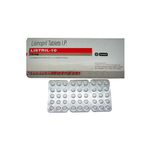lisace
Lisace 2.5mg Tablet is primarily prescribed to treat high blood pressure (hypertension), heart failure, and to improve survival after a heart attack.
Lisinopril belongs to the class of medications called angiotensin converting enzyme (ACE) inhibitors which acts by relaxing blood vessels, thereby lowering blood pressure and reducing the workload on the heart. It does this by inhibiting the action of ACE, an enzyme involved in the production of a substance that tightens blood vessels.
Following the prescribed dosage and advice from a healthcare professional is essential for effectively managing high blood pressure or other conditions with it. If you experience any adverse effects or have concerns, consult your healthcare provider promptly.
Similar Medicines
Available in 3 variations

Lisace 2.5mg Tablet
Lisace 2.5mg Tablet
Lisinopril (2.5mg)
strip of 10 tablets

Lisace 10mg Tablet
Lisace 10mg Tablet
Lisinopril (10mg)
strip of 10 tablets

Lisace 5mg Tablet
Lisace 5mg Tablet
Lisinopril (5mg)
strip of 10 tablets
Related Faqs

What are the safest blood pressure medicines?
Dr. Clements adds that ace inhibitors, angiotensin receptor blockers, calcium channel blockers, and thiazide diuretics may be safer treatment options for people with hypertension. “People who are on other types of blood pressure medications have an increased risk of death,” he adds.

What other lifestyle changes should I make while taking Lisace?
Lifestyle changes play a major role in keeping you healthy if you are taking Lisace. Avoid taking excess salt in your diet and find ways to reduce or manage stress in your life. Practice yoga or meditation or take up a hobby. Ensure that you have a sound sleep every night as this also helps to reduce stress levels and helps to keep your blood pressure normal. Stop smoking and alcohol consumption as this helps in lowering your blood pressure and preventing heart problems. Exercise regularly and take a balanced diet that includes whole grains, fresh fruits, vegetables and fat-free products. Consult your doctor if you need any further guidance to get the maximum benefit of Lisace and to keep yourself healthy.

After starting Lisace, I have developed dry cough which is very irritating and is not getting better with any medicine. What should I do now?
Lisace may cause dry cough, as a side effect in some people. This can be persistent and may not be relieved by any medicine. Talk to your doctor if it bothers you or if you have trouble sleeping. Your doctor may suggest ways of managing the cough or may prescribe another medicine. Remember, do not stop taking Lisace without consulting your doctor as it may increase your blood pressure and put you at a risk of developing a heart attack or stroke. Even if you stop taking Lisace, the cough may take a few days to a month to resolve completely.

Can Lisace increase potassium levels? If so, what should be done?
Lisace may increase potassium levels in the blood, especially if you have uncontrolled diabetes mellitus, kidney problems and dehydration. Also, potassium levels may increase in patients who are using potassium salts or medicines or are aged more than 70 years of age. Therefore, if you have any of these conditions and are using Lisace, be careful and get regular blood tests done to monitor potassium levels.

What is Lisace? What is it used for?
Lisace belongs to a group of medicines known as angiotensin-converting enzyme (ACE) inhibitors. It is used to treat high blood pressure (hypertension). It relaxes and widens the blood vessels, making it easier for the blood to pass through the vessels. As a result of this, the heart does not have to work more to push the blood. Since the workload on the heart is reduced, it helps to lower the blood pressure and thus reduces the risk of heart attack and stroke.
Related Posts

1:15
How to Increase Your Child’s Weight Naturally? Healthy Diet Tips for Parents!

1:15
Are Your Hormones Out Of Balance? Signs & Symptoms!

1:15
Amazing Benefits of Flaxseeds | Best Way to Eat Flax Seeds Daily!

1:15
Why Is There Blood in Your Poop? Causes, Symptoms, and When to See a Doctor!

1:15
How Do You Know If You Have a Vaginal Infection? Warning Signs!
Disclaimer : This information is not a substitute for medical advice. Consult your healthcare provider before making any changes to your treatment . Do not ignore or delay professional medical advice based on anything you have seen or read on Medwiki.
lisace
Prescription Required
Manufacturer :
Anglo-French Drugs & Industries LtdComposition :
Lisinopril (2.5mg)


















.svg)
